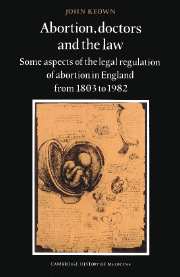 Abortion, Doctors and the Law
Abortion, Doctors and the Law Published online by Cambridge University Press: 26 October 2009
Chapter 5 suggested that the discretion which the Abortion Act 1967 afforded to medical practitioners has been exercised in an extensive way to such a degree that, in medical practice if not in legal theory, abortion has been available ‘on request’ and for social reasons both in the private sector and, to a somewhat lesser degree, in the National Health Service (N.H.S.), and that the safeguards which were incorporated into the Act ostensibly to curb such practices have proved largely ineffective. Further evidence to support these suggestions will be provided in this chapter, which outlines the major legislative attempts made between 1969 and 1979 to curb perceived abuses of the law by amending the Act restrictively, and which focusses on the profession's reaction to such proposals.
The Stjohn–Stevas Bill (1969)
After the Act had been in operation for only fifteen months, Mr St John–Stevas introduced a ‘ten minute rule’ Bill entitled, ‘A Bill to improve the law governing abortion and the status and rights of the medical profession in relation thereto’. Clause 1 of the Bill sought to provide that one of the two opinions required by the Act was given by a consultant gynecologist holding office under the N.H. S. (or a doctor of equivalent status approved by the Minister of Health) and that the operation was performed by him or under his supervision. The declared aims of the Bill were to check racketeering, which the Act's safeguards had been unable to prevent, and to ensure that the operation was performed under the best possible conditions.
To save this book to your Kindle, first ensure [email protected] is added to your Approved Personal Document E-mail List under your Personal Document Settings on the Manage Your Content and Devices page of your Amazon account. Then enter the ‘name’ part of your Kindle email address below. Find out more about saving to your Kindle.
Note you can select to save to either the @free.kindle.com or @kindle.com variations. ‘@free.kindle.com’ emails are free but can only be saved to your device when it is connected to wi-fi. ‘@kindle.com’ emails can be delivered even when you are not connected to wi-fi, but note that service fees apply.
Find out more about the Kindle Personal Document Service.
To save content items to your account, please confirm that you agree to abide by our usage policies. If this is the first time you use this feature, you will be asked to authorise Cambridge Core to connect with your account. Find out more about saving content to Dropbox.
To save content items to your account, please confirm that you agree to abide by our usage policies. If this is the first time you use this feature, you will be asked to authorise Cambridge Core to connect with your account. Find out more about saving content to Google Drive.